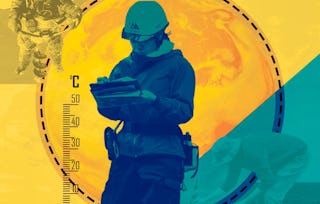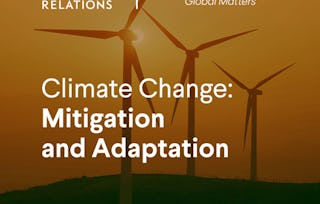In this course, learners will become familiar with the scientific evidence that demonstrates human-caused climate change. We will explore how greenhouse gases cause the Earth to warm, and why our recent warming is attributed to human activities. We will also discuss where our climate is headed, including anticipated future temperature, precipitation, and sea level. Learners will engage with the consequences of these changes on our ecosystems, infrastructure, and communities. We will also identify how political beliefs influence our attitudes about climate change, and apply that knowledge to become better climate communicators.

Ends soon: Gain next-level skills with Coursera Plus for $199 (regularly $399). Save now.

What is Climate Change?
This course is part of Exploring Our Responses to Climate Change Specialization

Instructor: Joseph Casola
13,244 already enrolled
Included with
(166 reviews)
What you'll learn
Identify the major components of the climate system
Explain the role of anthropogenic greenhouse gas emissions as the drivers of global climate change
Identify the primary physical and ecological impacts of climate change
Explain the unique process by which scientific information is produced
Skills you'll gain
Details to know

Add to your LinkedIn profile
See how employees at top companies are mastering in-demand skills

Build your subject-matter expertise
- Learn new concepts from industry experts
- Gain a foundational understanding of a subject or tool
- Develop job-relevant skills with hands-on projects
- Earn a shareable career certificate

There are 3 modules in this course
Climate change is real. Scientists agree that human activities are causing the climate to change. Warming will continue in the 21st century, and the amount of warming will be determined by our emissions of greenhouse gases.
What's included
5 videos2 readings1 assignment
The net impact of climate change on ecosystems, infrastructure, and communities is expected to be negative. Many impacts are already occurring, and we expect future warming to exacerbate their effects.
What's included
6 videos1 reading1 assignment
To stay informed about climate change, it is important to know where to get credible information. It’s also important to understand how scientific information is unique from other types of knowledge. Also, it can be helpful to recognize that others’ opinions on climate are heavily influenced by political affiliation. When engaging with others on climate, information needs to be tailored to take into account your audiences concerns and world views.
What's included
6 videos2 readings1 assignment1 peer review
Earn a career certificate
Add this credential to your LinkedIn profile, resume, or CV. Share it on social media and in your performance review.
Instructor

Offered by
Explore more from Environmental Science and Sustainability
 Status: Free Trial
Status: Free TrialCouncil on Foreign Relations
 Status: Free Trial
Status: Free TrialDuke University
 Status: Free Trial
Status: Free TrialBanco Interamericano de Desarrollo
 Status: Free Trial
Status: Free TrialCouncil on Foreign Relations
Why people choose Coursera for their career




Learner reviews
166 reviews
- 5 stars
88.55%
- 4 stars
8.43%
- 3 stars
1.80%
- 2 stars
0.60%
- 1 star
0.60%
Showing 3 of 166
Reviewed on Mar 17, 2021
This course was really enjoyable to take and I learned a lot about climate change and how to find out more data on it.
Reviewed on Jan 24, 2024
Excellent work by the tutor, hope more student will take benefit from this course.
Reviewed on Jun 12, 2022
Relevant information, digestible lessons, perfect for professionals who need to incorporate climate planning. And who doesn't?
Frequently asked questions
To access the course materials, assignments and to earn a Certificate, you will need to purchase the Certificate experience when you enroll in a course. You can try a Free Trial instead, or apply for Financial Aid. The course may offer 'Full Course, No Certificate' instead. This option lets you see all course materials, submit required assessments, and get a final grade. This also means that you will not be able to purchase a Certificate experience.
When you enroll in the course, you get access to all of the courses in the Specialization, and you earn a certificate when you complete the work. Your electronic Certificate will be added to your Accomplishments page - from there, you can print your Certificate or add it to your LinkedIn profile.
Yes. In select learning programs, you can apply for financial aid or a scholarship if you can’t afford the enrollment fee. If fin aid or scholarship is available for your learning program selection, you’ll find a link to apply on the description page.
More questions
Financial aid available,
¹ Some assignments in this course are AI-graded. For these assignments, your data will be used in accordance with Coursera's Privacy Notice.





